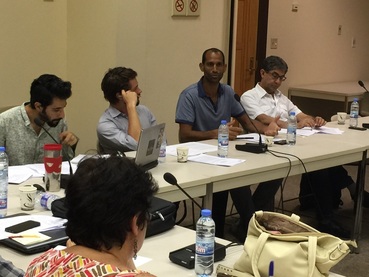- FAMA
- Researchers
-
Projects
- MESPI
- Knowledge Production Project >
-
Political Economy Project
>
- Development and the Uprisings
- Class Formations and Dynamics
- The Palestinian Economy: Fragmentation and Colonization
- Tunisia: A Political Economy in Transition
- Migrant States, Mobile Economies: Rethinking the Political in Contemporary Turkey
- Political Economy of the Middle East: Continuities & Discontinuities in Teaching & Research
- 2016 Political Economy Institute
- The Lebanon Project >
- The Palestine Project >
- The Civil Society Project >
- Middle East Media Project >
- The Egypt Project >
- Refugees and Migrants Project >
- Black-Palestinian Transnational Solidarities Project
- Initiatives
- Events
- Summer Institutes
- Internships
- Blog
The Refugees & Migration Project: Refugees in Lebanon, Setting a Research & Advocacy Agenda7/16/2015  16 July 2015 @ 9:00am - 7:00pm Beirut, Lebanon Sponsored by the Arab Studies Institute & George Mason University's Middle East Studies Program The Refugees & Migrants Project seeks to create a resource for scholarly production and advocacy on refugee, stateless, internally displaced, and migrant populations throughout the Middle East. The Middle East is home to the largest concentration of refugee populations globally. The largest amongst these are Palestinian refugees produced as a result of war who are stateless in some contexts, internally displaced in others, and victims of secondary and tertiary displacement in still other contexts. They also include an influx of Iraqi refugees engendered by the 2003 US war against, and occupation of, Iraq. Since the advent of the Arab Uprisings, these refugee communities have steadily grown in the face of armed conflict and civil unrest in the region, particularly in Syria, Libya, and Yemen as well as in the Sudan and Somalia. The Middle East is also the site of a significant migrant labor force. These migrants constitute a significant domestic, service, and construction labor force with relatively little to no government regulation. The lack of greater oversight together with their diminished political power subjects this vulnerable population to considerable exploitation. Beyond those populations who have been forcibly displaced or who have voluntarily sought economic opportunities across borders are a number of other stateless populations suffering from de facto and de juren statelessness like the Kurds of Syria as well as the children of refugee men and/or of women born out of wedlock in Lebanon and Egypt, for example. The region’s density of migrant and refugee communities is not commensurate with the scholarly research, civil society advocacy, or social awareness regarding their conditions. This Project seeks to encourage scholarly production, advocacy efforts, and political awareness concerning transitory populations across the Middle East. It aims to address pertinent questions regarding applicable law, the socio-political status of these communities, as well as the political initiatives necessary to address their pressing needs. The Lebanon Workshop consisted of a half-day roundtable that put stakeholders, institutions, and agencies concerned with refugees into conversation with one another. The purpose of the roundtable was to evaluate how a set of decentralized factors, namely stakeholders, aid, and law, intersect and shape the conditions and prospects by refugee communities within Lebanon. To this end, the discussion sought to identify existent refugee communities within Lebanon; to identify the humanitarian conditions they endure; to assess the services available to them as well as the relative disparities among them as a result of government intervention, foreign aid, and available social services; and to evaluate the legal regimes (refugee, civil, and criminal) regulating the lives of refugees including their migratory flow, their status within Lebanon, as well as their access to employment. Lessons learned from the proceedings should also inform how to initiate similar workshops in other countries that host significant refugee populations like Jordan, Egypt, Tunisia, and Turkey.
0 Comments
Leave a Reply. |
Forum on Muslim and Arab AffairsFAMA is the research arm of the Arab Studies Institute. Archives
June 2017
Categories |
- FAMA
- Researchers
-
Projects
- MESPI
- Knowledge Production Project >
-
Political Economy Project
>
- Development and the Uprisings
- Class Formations and Dynamics
- The Palestinian Economy: Fragmentation and Colonization
- Tunisia: A Political Economy in Transition
- Migrant States, Mobile Economies: Rethinking the Political in Contemporary Turkey
- Political Economy of the Middle East: Continuities & Discontinuities in Teaching & Research
- 2016 Political Economy Institute
- The Lebanon Project >
- The Palestine Project >
- The Civil Society Project >
- Middle East Media Project >
- The Egypt Project >
- Refugees and Migrants Project >
- Black-Palestinian Transnational Solidarities Project
- Initiatives
- Events
- Summer Institutes
- Internships
- Blog

 RSS Feed
RSS Feed
